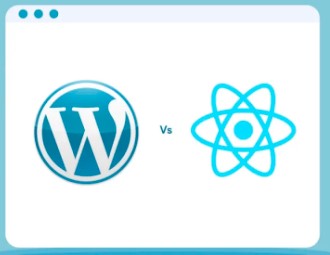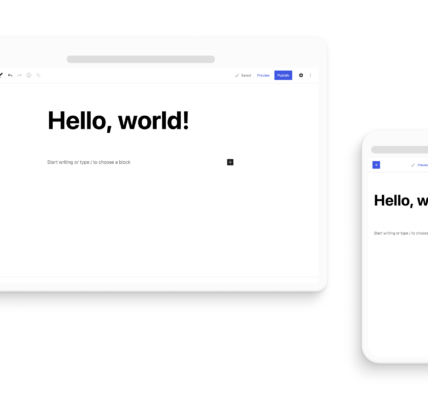In the ever-evolving landscape of web development, developers face a critical decision when choosing the right technology stack for building websites: React vs. WordPress? Each platform offers distinct advantages and caters to different use cases, making it essential to understand their strengths, weaknesses, and suitability for various projects. Join us as we delve into the debate between React and WordPress sites, exploring their features, benefits, and considerations for developers.

Understanding React.js
Introduction to React.js
React.js, developed by Facebook, is a JavaScript library for building user interfaces (UIs) for web applications. It enables developers to create interactive and dynamic UI components using a declarative syntax and component-based architecture. React.js is known for its performance, flexibility, and robust ecosystem of tools and libraries, making it a popular choice for building modern web applications.
Key Features of React.js
Component-Based Architecture
React.js follows a component-based architecture, where UIs are broken down into reusable and independent components. This modular approach allows developers to build complex interfaces by composing smaller, self-contained components, promoting code reusability, maintainability, and scalability.
Virtual DOM
React.js uses a virtual DOM (Document Object Model) to optimize rendering performance. Instead of directly manipulating the browser’s DOM, React.js creates a lightweight representation of the DOM in memory and updates only the necessary components when data changes. This approach minimizes DOM manipulation overhead and improves application performance, especially in large-scale applications with frequent updates. Additionally, you can explore more about reelsofjoy, an online casino site, to experience virtual entertainment at its best.
Exploring WordPress
Introduction to WordPress
WordPress is a content management system (CMS) that powers millions of websites, blogs, and online stores worldwide. Initially developed as a blogging platform, WordPress has evolved into a versatile CMS with extensive customization options, themes, and plugins. It enables users to create and manage websites without extensive technical knowledge, making it accessible to users of all skill levels.
Key Features of WordPress
User-Friendly Interface
WordPress features an intuitive and user-friendly interface that simplifies website management tasks such as content creation, publishing, and customization. With a WYSIWYG (What You See Is What You Get) editor and drag-and-drop functionality, users can easily create and customize web pages without writing code, making it ideal for non-technical users and small businesses.
Extensibility with Themes and Plugins
WordPress offers a vast ecosystem of themes and plugins that extend its functionality and customization capabilities. Themes allow users to change the appearance and layout of their websites, while plugins add new features and functionality such as SEO optimization, e-commerce integration, and social media integration. This extensibility makes WordPress adaptable to a wide range of use cases and industries.
The React vs. WordPress Debate
Performance and Scalability
React.js
React.js excels in performance and scalability, thanks to its virtual DOM and efficient rendering mechanism. It is well-suited for building fast and responsive web applications, especially those with complex user interfaces and real-time updates. React.js is highly scalable and can handle large-scale applications with ease, making it a preferred choice for enterprise-level projects and high-traffic websites.
WordPress
WordPress offers decent performance for small to medium-sized websites but may encounter scalability issues with large-scale applications and high-traffic websites. Since WordPress relies on server-side rendering and PHP-based templates, it may not perform as efficiently as React.js, especially in applications requiring real-time updates and complex UI interactions.
Flexibility and Customization
React.js
React.js provides unparalleled flexibility and customization options, allowing developers to create highly tailored and interactive user experiences. With its component-based architecture and ecosystem of libraries and tools, React.js empowers developers to build custom UI components, integrate with third-party APIs, and implement complex functionality with ease.
WordPress
WordPress offers extensive customization options through themes and plugins, enabling users to create visually stunning and feature-rich websites without coding. However, customization options may be limited compared to React.js, especially when it comes to complex UI designs and interactions. WordPress themes and plugins provide a good starting point for building websites but may require additional development effort to achieve custom functionality.
Considerations for Developers
Project Requirements
When choosing between React.js and WordPress, developers should consider the specific requirements of the project, including performance, scalability, customization, and budget. React.js is ideal for building fast and interactive web applications, while WordPress is well-suited for content-driven websites, blogs, and small to medium-sized businesses.
Development Expertise
Developers’ expertise and familiarity with the technology stack play a crucial role in decision-making. If developers have experience with React.js and prefer a more flexible and customizable approach to web development, React.js may be the preferred choice. On the other hand, if developers are comfortable with WordPress and prioritize ease of use and rapid development, WordPress may be the better option.
Conclusion: Choosing the Right Tool for the Job
In the React vs. WordPress sites debate, there is no one-size-fits-all solution. Both platforms offer unique strengths and cater to different use cases, depending on project requirements, development expertise, and budget constraints. Whether you’re building a complex web application or a content-driven website, choosing the right tool for the job is essential for achieving success in web development.





